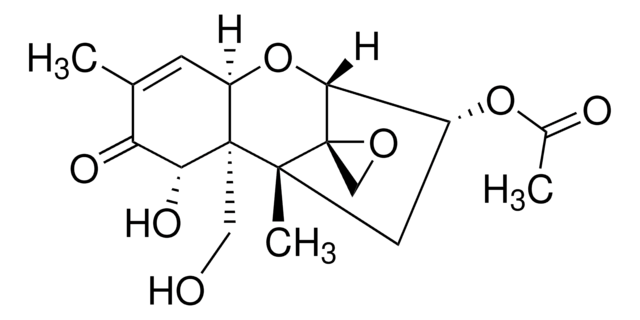D0156
Deoxynivalenol
Sinónimos:
3α,7α,15-Trihydroxy-12,13-epoxytrichothec-9-en-8-one, Vomitoxin
About This Item
Productos recomendados
form
powder
Quality Level
storage temp.
2-8°C
SMILES string
[H][C@]12O[C@]3([H])[C@H](O)C[C@@](C)([C@]34CO4)[C@@]1(CO)[C@H](O)C(=O)C(C)=C2
InChI
1S/C15H20O6/c1-7-3-9-14(5-16,11(19)10(7)18)13(2)4-8(17)12(21-9)15(13)6-20-15/h3,8-9,11-12,16-17,19H,4-6H2,1-2H3/t8-,9-,11-,12-,13-,14-,15+/m1/s1
InChI key
LINOMUASTDIRTM-QGRHZQQGSA-N
¿Está buscando productos similares? Visita Guía de comparación de productos
General description
Application
- as a mycotoxin to induce cytotoxicity in porcine jejunal epithelial cells and study the protective effects of Saccharomyces cerevisiae on the cell viability of host cells.
- to induce toxicity in nude mice to study the effect of probiotics (Lactobacillus rhamnosus GG (LGG) or Lactobacillus acidophilus (LA)) supplementation on host protection
- as a thyroid hormone receptor (TRβ) antagonist in cell-based luciferase reporter gene (CALUX) assay
Biochem/physiol Actions
signalword
Danger
hcodes
Hazard Classifications
Acute Tox. 2 Oral
Storage Class
6.1A - Combustible acute toxic Cat. 1 and 2 / very toxic hazardous materials
wgk_germany
WGK 3
flash_point_f
Not applicable
flash_point_c
Not applicable
ppe
Eyeshields, Faceshields, Gloves, type P2 (EN 143) respirator cartridges
Elija entre una de las versiones más recientes:
Certificados de análisis (COA)
¿No ve la versión correcta?
Si necesita una versión concreta, puede buscar un certificado específico por el número de lote.
¿Ya tiene este producto?
Encuentre la documentación para los productos que ha comprado recientemente en la Biblioteca de documentos.
Los clientes también vieron
Nuestro equipo de científicos tiene experiencia en todas las áreas de investigación: Ciencias de la vida, Ciencia de los materiales, Síntesis química, Cromatografía, Analítica y muchas otras.
Póngase en contacto con el Servicio técnico








